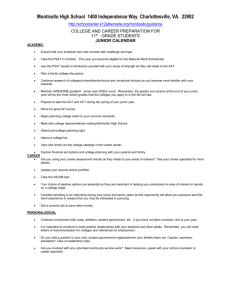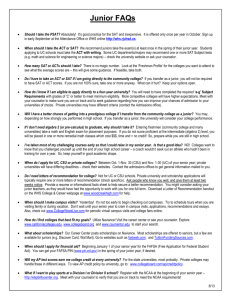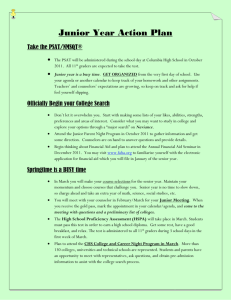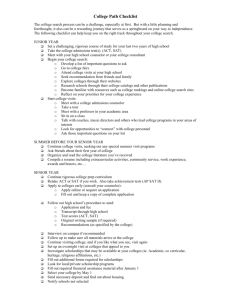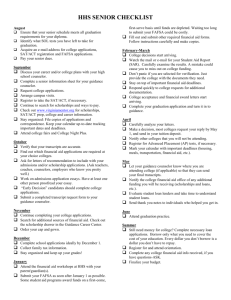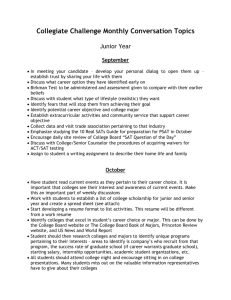The Junior Year Planning Handbook
advertisement
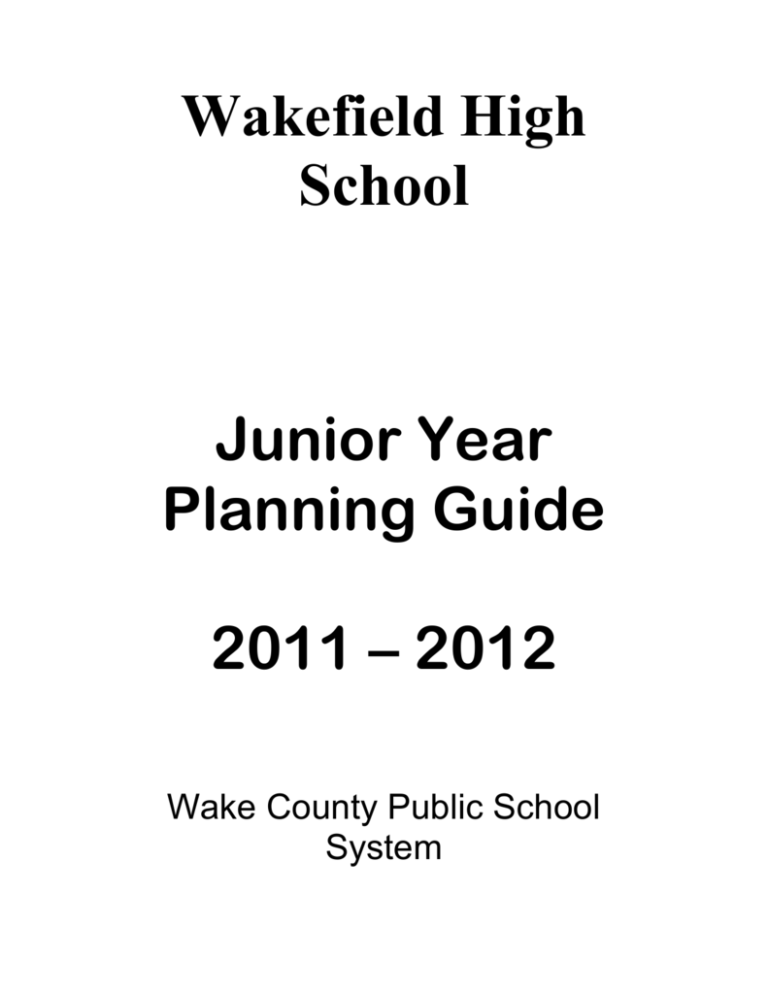
Wakefield High School Junior Year Planning Guide 2011 – 2012 Wake County Public School System Table of Contents Introduction 3 Student Services Contact Information 4 Planning Tools for the Junior Year 5 Junior Year Planning Calendar 6 Junior Planning Checklist 7-8 The College Search Simplified 9 College Comparison Worksheet 10 College Visit Information 11 Listing of NC Colleges and Universities Financial Aid Quiz Financial Aid for Juniors 12-14 15 16-17 Career Exploration/Dual Enrollment/Huskins 18 Student Resume Activity Sheet 19 Sample Resume/Summer Opportunities 20 Helpful Websites 21 2 WELCOME BACK JUNIORS! This planning guide is designed to help you plan a great junior year. There are many people and resources available to help you make the important decisions about your future. Use this guide to help you find information about college loans and scholarships, PSAT and SAT tests, and putting together a resume. Use the Junior Year Planning Calendar to keep on track with deadlines and planning. Talk to people about their careers, what they like, what they don’t like and think about what you might want to do after high school, and what you need to do to get there. Know your graduation and promotion requirements. Most high schools require 26 credits to graduate, (Enloe, Longview, Phillips, Southeast Raleigh, and Wake Early College of Health and Science require 20) and you can review Course of Study options here: http://www.ncpublicschools.org/curriculum/graduation Know your school counselor. Continue to explore career and college options. Know how to read and understand your high school transcript. Parents: Please encourage your student to actively participate in this planning process. You can help them be prepared for the challenges ahead, by helping them invest in planning for their future now. 3 Wakefield HS Student Services Contact Information Juniors Last Names A-Eg Virginia Moundous Vmoundous@wcpss.net 562-3674 Juniors Last Name Eh-K Nadia Maroun NMaroun@wcpss.net 562-3627 Juniors Last Names L-Rc Jessica Martz jlmartz@wcpss.net 562-3609 Juniors Last Names Rd-Z Rob Clark rclark6@wcpss.net 562-3628 SAP Counselor Pam Dannelly pdannelly@wcpss.net 562-3626 Dean of Students Early/Mid-Year Graduates Laura Inscoe LInscoe@wcpss.net 562-3625 Career Development Coordinator Sarah Joyner SJoyner@wcpss.net 562-3657 Financial Aid Counselor Ann Humphrey 562-3612 Registrar Kathy Namishia knamishia@wcpss.net 562-3664 Student Services Cynthia Torres 562-3612 4 Planning Tools for the Junior Year The Junior Year Planning Handbook - Use this handbook to guide you through the basic steps of post-secondary planning. Ask questions of your counselors, parents and teachers along the way. PSAT and SAT results – Sign up at your school for the PSAT. Your PSAT results will provide you a solid indication of what areas you need to focus on to achieve an appropriate score for college admission. ACT results – In this region of the country, the SAT is more widely used as a standard for admission. Use this website to convert your current ACT score to the SAT Reasoning Test: http://www.princetonreview.com/sat-act.aspx ASVAB results – Offered by the Armed Services, requires NO military commitment, and provides excellent feedback on career opportunities for you. Find out from the CDC (Career Development Coordinator) at your high school when it is being offered. www.cfnc.org - Referred to throughout this handbook, CFNC provides excellent tools for use throughout the planning process, as well as tools for your parents to use 5 Junior Year Planning Calendar August-September Review high school course plans and school activities Ensure that you are on track for graduation and college entrance requirements Think about how you will pay for college. Talk to your parents. Schedule a meeting with your counselor. Enroll in honors, AP, and advanced courses if you can. January Look at the dates for the SAT I, SAT II subject tests and ACT dates. Make sure you register to take the necessary tests. May Prepare for final exams, colleges will see these. November Begin to prepare for college entrance essays by keeping a diary of your interests, educational priorities and special talents. Check on nomination process for military academies February October Take the PSAT Attend College Fair Review academic records (report cards, GPA). March Find out how your counselor is going to do the junior interview and make sure you meet with your counselor. Student athletes: research NCAA Clearinghouse requirements. June Finalize your course selection. Develop your high school resume’. If you are taking an AP exam, talk with your teacher about registration information. December PSAT results are back. Identify college features that suit your needs. These include size, location, majors, financial opportunities and social or cultural activities. Review CFNC.org application process Register for SAT I, ACT or SAT II Subject tests, April Research summer enrichment opportunities and part time jobs. Narrow down your first and second choice. Apply early! July Visit college campuses 6 Junior Year Planning Checklist STUDENTS Register to take the PSAT/NMSQT (your school automatically provides this test). Check the dates and locations of local college fairs. Attend college fairs. WCPSS College Fair is in September at the McKimmon Center. National College Fair is in the March at the Raleigh Convention Center. Take the PSAT (Second Wednesday in October each year). Register for challenging course. (i.e., honors, advanced placement) Refine your lists of schools; eliminate the ones that do not meet your criteria. Request catalogs for schools remaining on your list. Visit those schools as well, many offer campus tours. Consider taking SAT/ACT prep courses to improve your scores. Register to take the SAT or ACT if appropriate to your post secondary plans. Find out which schools require the SAT II subject tests in addition to the SAT test. There are currently 15 subject tests. Consider volunteer experience in your area of interest. Finalize your list of 6-10 colleges or universities. Note all admissions deadlines. Register for a CFNC.org account to apply online if you don’t already have one. Develop a resume and keep it updated. CFNC.org can keep track of all of these things for you. Conduct scholarship research over the summer! You want to start applying for scholarships at the beginning of your senior year! ATHLETES! If you intend to participate in college athletics at a Division I or II school, start your NCAA Clearinghouse application at the END of the Junior Year. There is a staff member in your Student Services department who can assist you with this. PARENTS Help your student make realistic goals. Look at the financial costs for various colleges. Have your student start a checklist that includes deadlines and make sure they complete it. Allow your student to make their own future plans. Encourage independence, so that they will complete their own applications. Make sure they keep up their grades and turn in all assignments. Encourage them to do volunteer work and participate in extracurricular activities. Meet with your student’s counselor and attend any programs that are offered at the school. Make it possible for your student to visit many schools in his/her list. Teach your student how to advocate for themselves respectfully. Encourage your student to sign up for SAT study courses. Instill in your student the importance of deadlines. They will be crucial in their senior year. 7 STUDENT SERVICES Post information about volunteer opportunities and summer internships. Meet with Juniors and discuss requirements for both graduation and individual school/college admissions. Invite as many colleges and/or universities to your school as possible. Maintain catalogs and applications so that the students can look at them. Conduct parent and student workshops that will help with their transitions. Provide information and applications for SAT, ACT, SAT II and Financial Aid information and FAFSA forms. Send out transcripts and student records as requested. Encourage students to make good grades during their junior year as this is an important time to solidify good grades and class rank. Schedule appointments with parents and students to discuss post-secondary planning and appropriate options that meet their needs. 8 The College Search Simplified WHO: The student should be doing the primary research – this is his/her college education. Parents should be involved, having active discussions about schools, choices, monetary considerations and monitoring progress. WHAT: Actual usable information that will help facilitate the college planning process. 1) Use the College-Choice Worksheet from CFNC to help determine the traits most important to you in a school. 2) Take an interest inventory or career assessment if you have not already: http://www1.cfnc.org/Career_Center/Career_Key/home_-_Career_Key.aspx http://www.princetonreview.com/cte/quiz/career_quiz1.asp 3) Your major is the primary reason for selecting a school, so make sure that your major(s) is available at the schools your research. For help in finding a college that has your intended major(s), look for the Index of Majors on: www.princetonreview.com/. 4) If you are looking for a North Carolina school, use www.cfnc.org to help you research schools that relate to your specific interests. For schools outside of NC, refer to www.collegeview.com or www.collegeboard.com. If you do not have internet access, please use The College Handbook, located in your Student Services office or your Media Center. 5) Using the table in this handbook (p 7), fill in the information using the resources listed above. WHEN: Continuously throughout the junior year. WHERE: Some at school, some at home. Not just one or the other. HOW: Using the tools listed above, as well as contacting colleges directly for information. Please refer to the next two pages for school websites and phone numbers. There is a huge difference between this “paper” tour of a college that you will create by doing your research, a virtual tour that you might be able to take online and a real, personal tour of the college. Please visit colleges so that you get a true feel for the campus and the level of regular activity. Schedule that visit when school is in session – summer is great for travel, but not to get the real feel for a school. Did you know that you can first go to a Community College and finish a four-year degree on time through the College Transfer Program? Did you know that you cannot learn firefighting at a four-year UNC system school, but that our UNC system Community Colleges have this curriculum? Make sure that your college choice very accurately reflects your individual career goals and intentions! Two-year schools present some very attractive options for students who are not ready to pay the costs of a four-year university, or might like to explore other vocational interest options, even while accumulating college-transferable credits. 9 College Comparison Worksheet College Name Location -distance from home Expenses -tuition, room, board -est. total budget -application fee, deposit Size -enrollment Environment -type of school -setting (rural/urban) -size of nearest city -coed/single-sex -religious affiliation Admission Requirements -deadlines -tests needed -avg. GPA, rank, SAT/ACT scores -notification date Academics -my major offered? -accreditation -student-faculty ratio -avg. class size Financial Aid -deadlines -school-specific form? -% receiving aid -scholarships? Housing -guaranteed freshman housing? -meal plan Facilities -academic -recreational -other Activities -clubs, organizations -Greek life -athletics/intramurals -study abroad 10 College Visit Information You have made it to your junior year and the time has come for you to decide where you will be after you graduate from high school. Junior year is a great time to go visit potential colleges of your choice. First, call admissions to check when each college has their open house so that you will be able to get a first class tour. You need to start doing this early. The time to start applying will be here before you know it. A lot of college admission counselors will also meet individually with you and your parents to talk to you about your school. The more you are familiar with student life, academics and the campus in general the better off you will be to make a sound decision. Admissions can arrange to introduce you to upperclassmen and professors, and help you to determine your level of comfort with the school. There are also other benefits to visiting colleges in your junior year. You will know what classes you need to sign up for in your senior year and what grades/GPA may be necessary for admission. Knowing the range of G.P.A and SAT/ACT scores of the current year’s freshmen class will be very helpful to you. Once you have narrowed your list of colleges, set up campus visits in your senior year. SUGGESTIONS FOR YOUR VISIT 1. Pick a time to visit when classes are in session so that you can see the student interaction on campus. 2. See if they allow overnight visits in a dormitory or residence hall. 3. If you are interested in a sport, try to make contact with the coach of that sport. 4. Pick up a copy of the Campus Catalog and/or School Newspaper. 5. Talk to the students that actually attend the school. 6. Find out the cost to attend per year and the Financial Aid process. 7. Verify admission requirements and what is required for acceptance. 8. Check to see which programs are the most well-known. QUESTIONS TO ASK YOUR CAMPUS TOUR GUIDE 1. 2. 3. 4. How do students fit in here? What student organizations are open to freshmen? How adequate are the research facilities and student union? What is the percentage of classes that are taught by a professor versus a Teaching Assistant? 5. What are the housing options for freshmen? How many students live off campus? 6. Why did you choose this particular college? 7. How accessible are the college professors? 8. What are the biggest issues on campus? 9. What are the courses that present the biggest challenge for freshmen? 10. How are the dining facilities on campus? 11. Are freshman allowed to have cars on campus? 11 4-year UNC System Schools College Appalachian East Carolina University Elizabeth City State Univ. Fayetteville State University NC A&T University NC Central University NC School of the Arts NC State University UNC Asheville UNC Chapel Hill UNC Charlotte UNC Greensboro UNC Pembroke UNC Wilmington Western Carolina Univ. Winston-Salem State Univ. Website www.appstate.edu www.ecu.edu www.ecsu.edu www.uncfsu.edu www.ncat.edu www.nccu.edu www.ncarts.edu www.ncsu.edu www.unca.edu www.unc.edu www.uncc.edu www.uncg.edu www.uncp.edu www.uncwil.edu www.wcu.edu www.wssu.edu 4-year Private NC Schools College Barton College Belmont Abbey Bennett College Brevard College Campbell University Chowan College Davidson College Duke University Elon University Gardner-Webb University Greensboro College Guilford College High Point University Johnson C. Smith Univ. Lenoir-Rhyne College Louisburg College Mars Hill College Meredith College Methodist College Montreat College Mount Olive College North Carolina Wesleyan College Peace College Pfeiffer University Piedmont Baptist College Queens College Salem College Website www.barton.edu www.bac.edu www.bennett.edu www.brevard.edu www.campbell.edu www.chowan.edu www.davidson.edu www.duke.edu www.elon.edu www.gardner-webb.edu www.gborocollege.edu www.guilford.edu www.highpoint.edu www.jcsu.edu www.lrc.edu www.louisburg.edu www.mhc.edu www.meredith.edu www.methodist.edu www.montreat.edu www.mountolive.edu www.ncwc.edu www.peace.edu www.pfeiffer.edu http://www.pbc.edu/ps/ps_Default.aspx www.queens.edu www.salem.edu 12 St. Andrews Presbyterian St. Augustine’s College Wake Forest University Warren Wilson College Wingate University www.sapc.edu www.st-aug.edu www.wfu.edu www.warren-wilson.edu www.wingate.edu 2-year NC Community College and Technical Schools School Alamance Community College Asheville-Buncombe Tech Comm. College Beaufort County Community College Bladen Community College Blue Ridge Community College Brunswick Community College Caldwell Comm. Coll. & Tech. Institute Cape Fear Community College Carteret Community College Catawba Valley Community College Central Carolina Community College Central Piedmont Community College Cleveland Community College Coastal Carolina Community College College of The Albemarle Craven Community College Davidson County Community College Durham Technical Community College Edgecombe Community College Fayetteville Technical Community College Forsyth Technical Community College Gaston College Guilford Technical Community College Halifax Community College Haywood Community College Isothermal Community College James Sprunt Community College Johnston Community College Lenoir Community College Martin Community College Mayland Community College McDowell Technical Community College Mitchell Community College Montgomery Community College Nash Community College Pamlico Community College Piedmont Community College Pitt Community College Randolph Community College Richmond Community College Website www.alamance.cc.nc.us www.abtech.edu www.beaufort.cc.nc.us www.bladen.cc.nc.us www.blueridge.edu www.brunswick.cc.nc.us www.cccti.edu www.cfcc.edu www.carteret.edu www.cvcc.edu www.cccc.edu www.cpcc.edu www.cleveland.cc.nc.us www.coastalcarolina.edu www.albemarle.edu www.cravencc.edu www.davidson.cc.nc.us www.durhamtech.edu www.edgecombe.edu www.faytechcc.edu www.forsythtech.edu www.gaston.edu www.gtcc.edu www.halifaxcc.edu www.haywood.edu www.isothermal.edu www.sprunt.com www.johnstoncc.edu www.lenoircc.edu www.martincc.edu www.mayland.edu www.mcdowelltech.edu www.mitchellcc.edu www.montgomery.edu www.nashcc.edu www.pamlico.cc.nc.us www.piedmontcc.edu www.pittcc.edu www.randolph.edu www.richmondcc.edu 13 Roanoke-Chowan Community College Robeson Community College Rockingham Community College Rowan-Cabarrus Community College Sampson Community College Sandhills Community College South Piedmont Community College Southeastern Community College Southwestern Community College Stanly Community College Surry Community College Tri-County Community College Vance-Granville Community College Wake Technical Community College Wayne Community College Western Piedmont Community College Wilkes Community College Wilson Technical Community College www.roanokechowan.edu www.robeson.cc.nc.us www.rockinghamcc.edu www.rowancabarrus.edu www.sampsoncc.edu www.sandhills.edu www.spcc.edu www.sccnc.edu www.southwesterncc.edu www.stanly.edu www.surry.edu www.tricountycc.edu www.vgcc.edu www.waketech.edu www.waynecc.edu www.wpcc.edu www.wilkescc.edu www.wilsontech.edu 14 Financial Aid Quiz 1) We can’t qualify for any student loans. T F 2) Everyone is eligible for Financial Aid. T F 3) I don’t need to submit the FAFSA form to receive aid. T F 4) There is a fee to submit the Free Application for Federal Student Aid. T F 5) Scholarships are reserved only for those who are academically talented. T F 6) Individual schools do not need more information than what is on the application for me to receive financial aid. T F 7) My job off-campus can qualify as work-study. T F 8) Unsubsidized loans are loans where the federal government pays the interest while I am in college. T F 9) If I quit school, my loans are not due to be paid back until six months after I would have graduated. T F 10) There are no opportunities for scholarship available to me as a junior. T F 15 Financial Aid: Scholarships The best financial aid you can receive is through your own good planning! As a junior, the smartest thing you can do is find out what financial aid is out there for you, when it is due, and prepare your materials accordingly (including a resume or activity sheet, detailed later in this handbook). Most scholarship opportunities take place in the senior year – however, there are a few opportunities out there for juniors, particularly at individual colleges and universities sponsoring junior programs. First and foremost, DON’T PAY ANYONE FOR SCHOLARSHIP INFORMATION! If you receive a letter in the mail about your “appointment”, ignore it. There are a lot of scams out there that will take you for several hundred to several thousand dollars, and give you less information than you can receive for free from your high school. There are two types of financial aid: Gift-based aid and Need-based aid Gift-based aid comes in two forms: scholarships and grants. How can I best prepare for scholarships? Get good grades Participate in extracurricular activities, particularly things in which you have a serious interest. Be involved in your community, and take leadership roles. Start digging for scholarships, even though many will not be available to you as a junior – the point is to be ready for them as a senior! Who can get a scholarship? Many people miss out on opportunities because they simply don’t look in places close to home: 1) What major will you pursue? Who has scholarships related to your major? 2) Do you work? If so, does your employer have a scholarship available? 3) Do your parents work? If so, do their employers have scholarships available? 4) Are your parents members of any professional organizations that sponsor scholarships? ASK! 5) Are you or your parents members of any organizations – Boy Scouts, CASL Soccer, Lions Club, Rotary Clubs, etc. 6) Are either of your parents – and in some cases grandparents – veterans of active military service? ASK! 7) Have you examined your ethnic heritage for possible scholarship opportunities sponsored by ethnic-based organizations? 8) Do you have a special need or talent? Any special medical conditions – diabetes, learning disabilities or any disability that severely affects major life functions such as learning, working, etc. 9) ESSAYS – people hate to write them, and so they often lack applications. 10) Make sure you fill out college-specific financial aid forms – many schools have their own forms aside from the generic FAFSA form mentioned below. 11.) You can perform scholarship searches on the following websites: www.scholarshipplus.com/wake www.fastweb.com www.cfnc.org 16 Financial Aid: Grant, Loans, Work-Study Programs Need-based aid comes in three forms: grants, employment (Work-Study), and loans. To be eligible for need-based aid, you must fill out the FAFSA form. To review the FAFSA, please visit www.fafsa.ed.gov. DO NOT PAY ANYONE FOR FAFSA SUBMISSION! It is a free form, and many companies are happy to charge you to submit it for you. Grants primarily depend on your EFC (Estimated Family Contribution) from the FAFSA (Free Application for Federal Student Aid) form. You cannot actually fill out the FAFSA until January of your senior year. HOWEVER, you can encourage your parents to schedule a meeting with the Financial Aid Advisor at your high school, to use the financial aid calculators and planning tools available on www.cfnc.org and to meet with their financial advisor/planner if they have one. Work-Study: Employment will typically be an on-campus position, monitoring the front entrance of a dormitory, or working in a business office, or almost anywhere that a need arises on campus. You will be paid by the school. Loans come in all shapes and sizes, but there are two key words: subsidized and unsubsidized. Subsidized loans are essentially interest-free until you finish school OR are not a full-time student for six months. (If you leave school, six months later you are expected to start paying back the loans!) Unsubsidized loans wind up being more expensive, because they accrue interest the whole time you are in school, even though you do not start paying them back until you are six months out of school, finished or not. Original Amount Interest rate Interest while in school Amount owed upon graduation Subsidized loan 5000 4.17% $0 5000 Unsubsidized loan 5000 4.17% $768+5768 It may not make a big difference to you now, but what if you have to borrow this amount and more to finance school? It makes financial sense to fill out the appropriate paperwork in order to reduce the amount of interest you will have due in the end. 17 Career Planning/Exploration Career planning is a process that involves students, parents, teachers, counselors, and the community. The goal is to help students to make informed and thoughtful decisions about themselves and their future. The planning process includes helping students develop and implement an individual career plan. CFNC, Futures for Kids, and Bridges are valuable websites that have on-line Career Inventories which assess their interests, preferences, values, abilities, and talents in order to identify either general or specific careers. In addition, students may further explore careers by participating in Web Research, Informational Interviews, Job Shadowing, Internships, Summer Programs, Part-time Jobs, and Volunteering Opportunities. Dual Enrollment Dual enrollment gives high school students the opportunity to take approved courses at accredited institutions while completing high school graduation requirements. Courses taken must provide opportunities not currently available to students at Wakefield High School. High school graduation credit and grades will be awarded by Wakefield High School when the official transcript is received at Wakefield High School. Quality points will be calculated as defined in the Dual Enrollment Guidelines &Wake County Public School System High School Program Planning Guide. The student's official high school transcript will include the course and grade. Wakefield High School currently participates in the following dual enrollment opportunities: NC Virtual Public Schools (www.ncvps.org) Huskins Program at Wake Tech Offsite College Courses What is Huskins? These FREE courses take place at Wake Tech during the regular school day or in the evening, and are for high school students only. Spring courses that will be offered are DEN 111, NAS 101, MED 110, and MLT110. If a student is interested in taking a course this spring they need to see Mrs. Joyner in Student Services by October 28th. For further information, check out http://huskins.waketech.edu/index.php. Primarily these courses have been related to the Sciences field, but the course offerings are going to expand. Certification & Articulated Agreements Wake Tech offers certification programs for Wakefield High School students. These certificates match up with our Career and Technical department offerings. These certificate courses are also part of degree requirements at Wake Tech and ALL of the North Carolina Community College system. The Business core certificate courses will transfer to ALL schools within the UNC system. Students can find out if courses will transfer to a 4 year school by going to http://h3o4u.net/ and search CHOICES. 18 The North Carolina Department of Public Instruction and the North Carolina Community College System has an agreement giving CTE students articulated credit at any NC Community College if students meet the following requirements: o earn a B or better in the CTE class, o Score above an 80% raw score on the VoCATs exam (the raw score is what students earn before any curves have been made. Central office will notify us of what students meet this criteria) o Enroll at Wake Tech within 2 years of high school graduation. For more information about earning college credit while in high school, please visit Mrs. Joyner in student services. Student Resume Activity Sheet compliments of WCPSS Postsecondary Planning Guide The development of your student resume is an important step in planning for your future. You will use your student resume for many pursuits, including, but not limited to: afterschool and summer employment, volunteer work, job shadowing and internships, college applications, and scholarship applications. Your school counselor may use your resume (during your senior year) to write recommendations and to help you with the scholarship process. Each senior is encouraged to have a resume and share with the counselor. Your resume should be in a format that best highlights your experience, education and interests. A sample/template is included on the next page. One possible resume format may include the following sections: Heading: Name, Address, Telephone, email Skills: Technical and Computer Skills, People Skills, Language Skills, Work Skills, Certifications Education: Specialized classes or training, expected graduation from MHS Experience: Volunteer and paid work, special projects you have completed Activities: School and community activities in which you have participated (include dates, offices and awards) Interests: Cover anything not in “Activities” References: At least two non-family persons who can speak positively about your character, work ethic, and leadership. To create an online resume, visit www.CFNC.org and click on the Student Planner tab. You will need to create a USERNAME to use the High School Planner feature. 19 Your Address Your City, State and Zip Phone 919-555-0000 Fax 919-555-0000 E-mail youremail@wcpss.net First Last Skills List here the skills that you have (Cad Drafting, Culinary Arts, etc.) Work and volunteer experience List here any working experience (McDonald’s, clerical work, etc.) you have as well as volunteer experience (church, Habitat for Humanity, etc.) Education 19xx - 19xx Wakefield High School Raleigh, NC Working toward high school diploma 6) [ Details of position, award, or achievement. ] Interests and activities List your extracurricular activities and hobbies. References List here three people who know you well and their phone numbers. Summer opportunities Many colleges and universities have individual summer opportunities that allow students to involve themselves in a career interest, often for a small free or even for free. Often, those opportunities are not widely publicized, and students miss out. For a list of summer opportunities, please visit www.cfnc.org, and click “Search CFNC”, then type in “summer opportunities”. Don’t stop there! If you don’t know of anything that is readily available, ask around! Start with Student Services, and no one said that you couldn’t call the radio station or the Town Planning department yourself! Also, there are many volunteer opportunities available, depending on your interest and level of commitment (how often you are willing to participate). You can job shadow or participate in an internship over the summer, but summer is a great time to show you are more than an academic student, and that you are interested in and worthy of a chance to go to the school of your choice. Other summer opportunities can be found at individual school institutions by using the websites listed in the college planning section of this handbook. 20 Comprehensive Guides http://www.wcpss.net/cass/counseling/ Wake County Schools Student Services Program Planning Guide- Contains information for each high school grade level as well as for postsecondary planning. www.collegeboard.com The College Board Contains information on College Board testing, admissions, financial aid, and scholarships. http://www.usnews.com/usnews/edu/eduhome.htm College rankings and admissions and financial aid information. US News College Center www.mapping-your-future.org Mapping Your Future Links to career assessments, college info, and scholarships Peterson’s www.petersons.com Search colleges by GPA, tuition, sports and more. College Search Sites Counselor-o-matic www.princetonreview.com Information on colleges, scholarships, and the Princeton Review College View www.collegeview.com Information on colleges, scholarships, and careers. FAFSA on the Web www.fafsa.ed.gov Application for the Free Application for Federal Student Aid. FastWEB www.fastweb.com A free, searchable scholarship database. College Foundation of North Carolina www.cfnc.org General information on the financial aid process. Apply directly to UNC-system schools; keep track of extracurricular activities; and much more www.ncaaclearinghouse.net NCAA Clearinghouse Information for student athletes who want to play in college. 21
